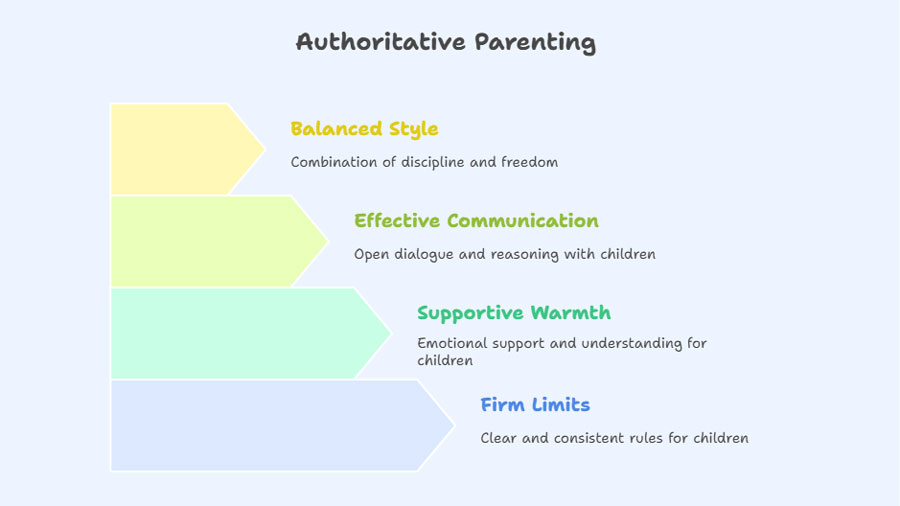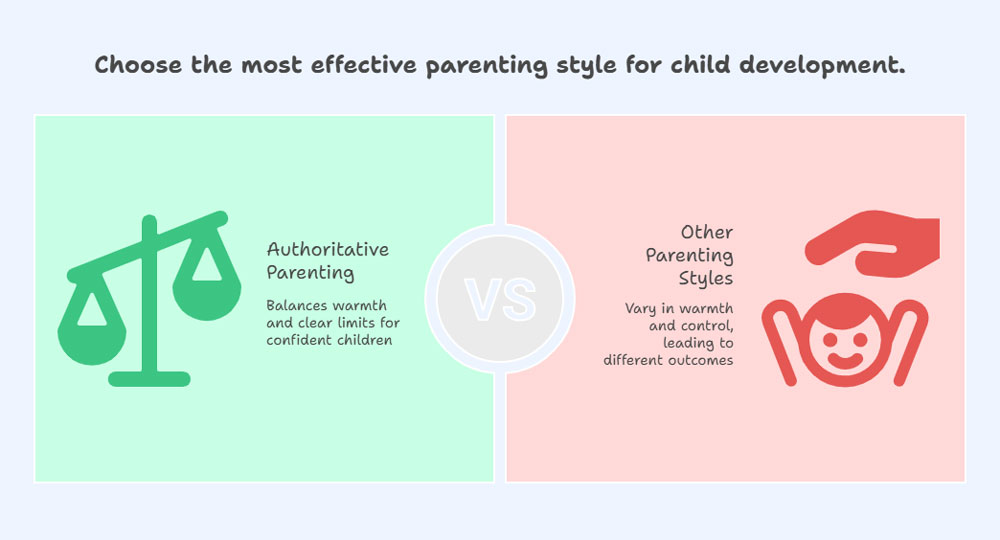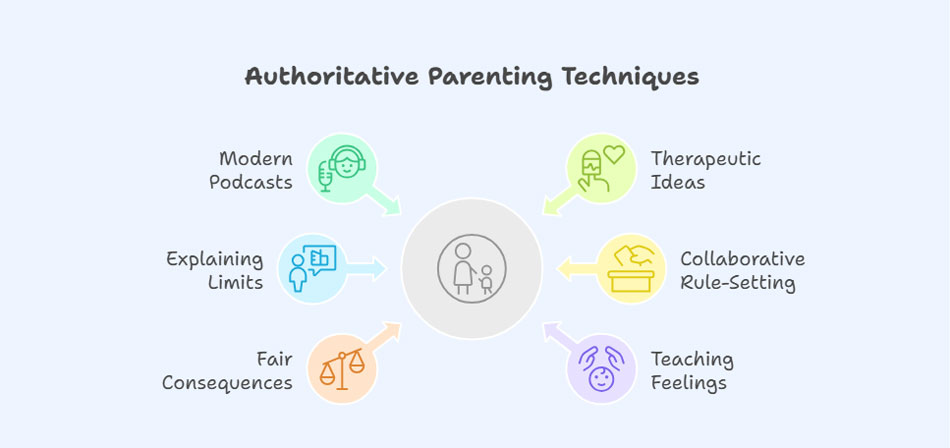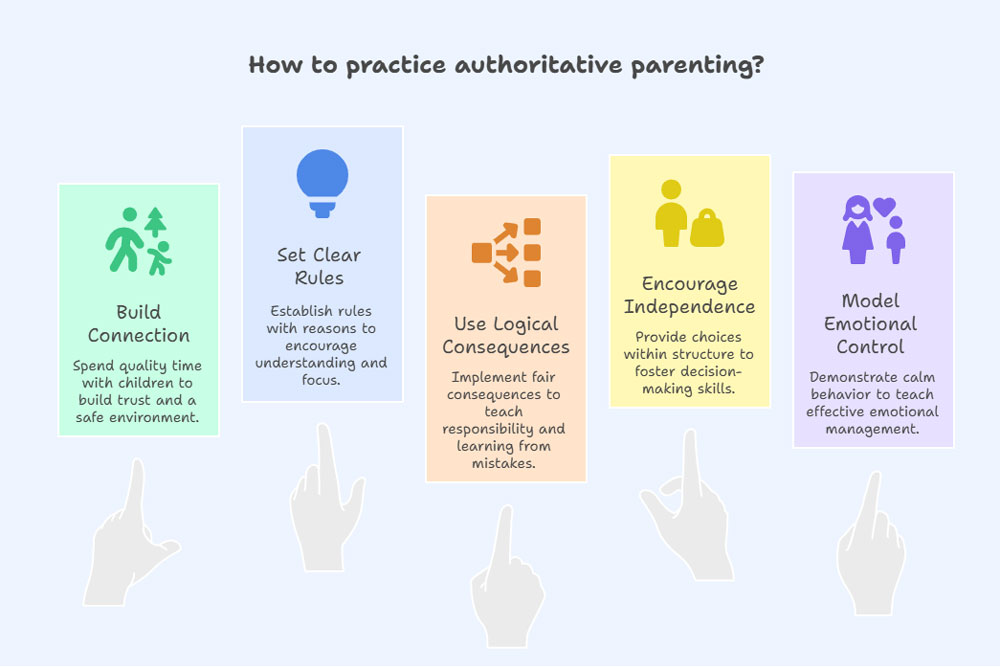Those who follow our posts know I have two energetic, lovely kids. My wife and I have spent countless days researching which parenting style is most encouraged in modern America. Like many parents, we face post-pandemic mental health challenges, screen time battles, and cultural shifts. Here, I share my research and experience: authoritative parenting is the perfect style backed by experts, extensive studies, and successful American parents.
According to the Harvard Graduate School of Education, authoritative parenting is linked to positive developmental outcomes for kids. So, stay with me and today’s FamilyApex post to find out more about the most encouraged parenting style.
Authoritative parenting is the most encouraged style in modern America. It combines firm limits with warmth, so it helps kids get 15% higher grades. You explain rules kindly to your kid, which builds trust. You use fair consequences, as research links this style to self-esteem. It fits single-parents and blends with attachment’s love.
What Is Authoritative Parenting?
Simply put, authoritative parenting is the style that combines firm limits with supportive warmth. It may seem controversial, but through authoritative parenting, you can effectively communicate with your child while maintaining clear and consistent rules. In other words, it’s high on responsiveness and expectations. You set rules by reasoning and explaining kindly to your lovely kid.
Every parent, just like me, wishes to keep a balance between discipline and freedom, and here is the authoritative parenting doing the hard job for you. A study by the National Institutes of Health states that 64% of confident U.S. parents employ a balanced style, such as authoritative parenting.
Example: When my son fights bedtime, I say, “Bedtime keeps you strong. Pick a story, but lights out at 8 PM.” This gives him a choice (his book) and keeps him to firm rules (the time). It turns arguments into learning moments, tailored to your focus on both empathy and responsibility.

Why Do Parents Pick Authoritative Parenting Today?
As a millennial dad who didn’t care about rules growing up, I want a parenting style that keeps my kids within the framework while giving them enough freedom. What better than authoritative parenting? Let’s just see the reasons why modern America prefers this one, too:
- Matches our style: It mixes freedom and responsibility, perfect for America’s go-your-own-way vibe. My kids learn screen time rules, which teach them to be responsible.
- Helps mental health: Kids handle emotions better and have fewer issues. It keeps them calm and happy in hard times.
- Sets kids up to win: It helps them do great at school and with friends. My son feels confident making his own choices.
- Fits today’s trends: A 2023 survey by Pew Research Center says 45% of parents hover too much, but 64% feel they’re doing well, picking authoritative parenting after the pandemic.
This table shows why parents choose authoritative parenting:
| Reason | Benefit | Parenting Outcome | Cultural Fit |
| Matches style | Mixes freedom, responsibility | Teaches responsibility | Fits go-your-own-way vibe |
| Boosts mental health | Helps kids handle emotions | Keeps kids calm | Suits tough times |
| Sets kids up to win | Helps kids excel at school, friends | Builds confidence | Aligns with success goals |
| Fits trends | Parents feel they’re doing well | Grows confident kids | Matches post-pandemic needs |
What Does Science Say About Authoritative Parenting?
Diana Baumrind first identified authoritative parenting in the 1960s. She linked the style with healthy development in children. Imagine a kid with high self-reliance, social competence, and self-esteem, and you are that happy parent of his or hers!
Maccoby and Martin expanded this work, combining the dimensions of demandingness and responsiveness. They defined four parenting styles (authoritative + 3 more): authoritative, authoritarian, indulgent, and neglectful. Authoritative parenting helps students’ emotional and social skills. Children typically earn better grades, approximately 15% higher (source: ResearchGate).
Research also shows that behavior issues in children drop by 20-30% with authoritative parenting. The AAP adds that balanced parenting is generally referred to as authoritative parenting, which increases self-esteem in children as they grow up.
Authoritative Parenting vs. Other Styles: What Are the Differences?
While researching the best parenting styles, you come across various options. Each has unique features. To ensure authoritative parenting tops the list, below we will go over their differences:

Authoritarian Parenting
Those strict rules that all children hate come with just a little warmth in authoritarian parenting. Kids obey the rules, and no discussion is accepted. This style can result in children’s anxiety and lack of self-confidence. These are the differences between authoritarian and authoritative parenting:
- Offers less warmth than the authoritative’s high love.
- Gives no explanations, unlike the authorities’ clear reasons.
- Uses rigid control instead of authoritative fair limits.
- Leads to anxious kids rather than confident ones.
Permissive Parenting
Despite an authoritarian style, permissive parenting drowns children with love. You see a few rules as parents try to play the role of their kids’ friends. They don’t get mad at their cutie, as you can not find the strict limitations. Main differences are:
- Has fewer rules than the authoritative’s clear limits.
- Offers less guidance than authoritative, structured support.
- Leads to weak boundaries, unlike the authoritative responsible behavior.
Uninvolved Parenting
No Love, no rules, no support, nothing special in the uninvolved style. You see parents far away from their children. Weird, as they even give no specific response to their children’s needs. Children often end up feeling abandoned or insecure. Key differences include:
- Lacks warmth, unlike the authoritative’s high love.
- Has no rules compared to the authoritative’s clear limits.
- Acts are neglectful instead of an authoritative, supportive approach.
- Causes insecurity rather than instilling confidence in authority.
Modern Parenting Variants
The most well-known modern parenting variants include:
- Helicopter parenting: Parents keep a close eye on kids. They control everything their children do. This is in contrast with the child’s independence. It limits freedom instead of encouraging it.
- Attachment parenting: Parents give love to their children with no boundaries. They concentrate on tight bonds. Such close relationships help children feel secure. Its love is more intense and may skip clear rules.
- Lighthouse parenting: Parents guide like a lighthouse. They offer steady support but let kids explore. This mixes freedom and safety. It gives distant support, something we don’t see in an authoritative style.
This table shows how authoritative parenting stacks up against other styles:
| Parenting Style | Warmth/Love | Rules/Limits | Outcomes |
| Authoritative | High love | Clear, consistent limits with reasons | Confident, responsible behavior |
| Authoritarian | Little warmth | Strict rules, no discussion | Anxiety, lack of self-confidence |
| Permissive | Drowns with love | Few rules, no strict limits | Weak boundaries |
| Uninvolved | No love | No rules | Feeling abandoned, insecurity |
| Helicopter | Not specified | Controls everything | Limits child’s independence |
| Attachment | Love with no boundaries | May skip clear rules | Secure but intense bonds |
| Lighthouse | Steady support | Distant support, mixes freedom | Freedom and safety |
How Modern American Parents Are Using Authoritative Techniques
Modern American parents have adapted themselves to authoritative techniques very well. I have seen this style running through all families who care about choosing the most appropriate educational methods. Are you eager to know how? Below are the ways:
- Modern parents follow modern podcasts. They take up courses that help them raise healthy children, mentally or physically.
- Today’s young parents recognize how therapeutic ideas can help protect their children from trauma and strengthen their bonds.
- Nowadays, parents shift from “do as I say” to “here’s why this matters.” They explain limits to help kids understand.
- Children are right to set limits and rules just like parents. They do this together by reasoning and being responsive to the kids’ needs.
- Gone are the days when harsh punishments worked. Parents would consider fair consequences for wrong activities.
- Parents teach kids to name feelings. This helps kids stay calm and handle stress. This is the wonder that authoritative techniques bring.

Tips to Practice Authoritative Parenting at Home
Now that we all know authoritative parenting can be a lifesaver for parents like us, let’s get through some important points and tips about it. The following tips tell you how to apply the method best and get the most out of it:
- Build Connection First: Spend time with your children. Some parents, especially fathers, replace spending money with time. That’s a huge mistake. You need to build trust. So, play games with them, take them to the park, and build a safe place to live for them. A study from the University of Nevada found that parenting programs using logical consequences lead to significant improvements.
- Set Clear Rules with Reasons: Every rule comes with a reason, even the simplest. You don’t need to get mad or explain them in a loud voice. Just keep clear. For instance, you can say “no screens before homework”. Let your kids think and focus by providing the reason. Rules are not supposed to be orders.
- Use Logical Consequences: No strict punishment is allowed! Every wrong movement by your child must follow a fair consequence. Do not teach them how to fear; just teach them how to rebuild and learn from their mistakes.
- Encourage Independence Within Structure: Give your children choices, but with limitations. For example, they can pick their outfit themselves, but during the winter, they should wear warm clothes. This way, they feel free but safe. They will also learn how to make big decisions in the future.
- Model Emotional Control: Tough moments happen in every family; you must react with calm behavior. Children look at you and learn how to stay cool. They will handle their stress without yelling when they grow up. Try to build emotional strength and teach them how to manage their emotions effectively.

Authoritative Parenting in Action: Real-Life Scenarios & Solutions
I have pictured three different situations that may happen to every parent. You can see what to do in the following real-life scenarios based on the authoritative parenting style:
- Tantrum at a playdate: Imagine your kid crying over a toy that he needs to share. You say, “I know you’re mad.” You give them a different toy to calm down. Later, you talk about his feelings. No strict punishment, please!
- Screen time battles: See your kid asking for more tablet time. You set a timer and say, “This keeps it fair.” Extra time today means less tomorrow. Stay calm but firm.
- Sibling fights: Think of your kids fighting over a game. You ask, “What is the problem? What’s the fix?” You help them talk and sort it out together.
Is Authoritative Parenting Right for Every Family?
The short answer to such a question is yes. Authoritative parenting is an appropriate style that works wonders in many families. That mixes love and rules in the most balanced way. That means you are raising children with high mental health. Below are more reasons why it is practical:
- It fits different cultures, personalities, and family structures, like single-parent
- Parents use consistent effort with authoritative parenting instead of aiming for perfection every day.
- You can blend it with other styles, like attachment’s warmth or gentle parenting’s empathy, when needed.
Final Thoughts: Why Authoritative Parenting Wins in America Today
As the most encouraged and used parenting style in modern societies like America, Authoritative parenting sets the stage for raising healthy and successful children. It combines love and rules in the most balanced way. Moreover, research supports its benefits and effectiveness. No matter where you live and what culture you belong to, you can opt for Authoritative parenting so that your kids develop skills for emotions, school, and friendships.
I at FamilyApex am looking forward to hearing your ideas as well. Keep in touch and help us craft a better life for more and more people.
FAQs
1- What is authoritative parenting and its benefits?
Authoritative parenting combines firm limits with supportive warmth. It helps kids grow strong and sets them up to win in school and with friends.
2- How does authoritative parenting compare to other styles?
Unlike authoritarian’s strict rules, permissive’s few rules, or uninvolved’s no love, authoritative parenting blends love with consistent rules. It tops the list.
3- How do parents apply authoritative parenting at home?
You set rules by explaining kindly to your lovely kid. You help them talk and sort it out together.
4- Does authoritative parenting suit every family in 2025?
Authoritative parenting is suitable for various cultures and family structures, including single-parent families. The short answer to such a question is yes.



